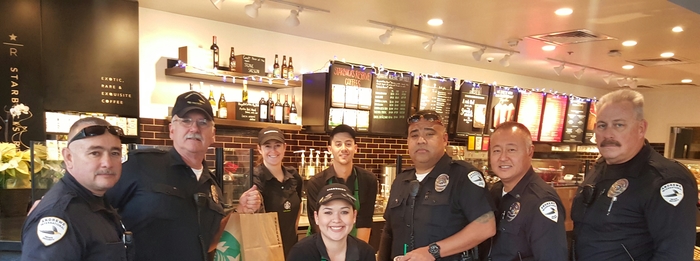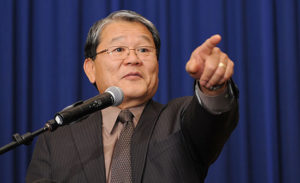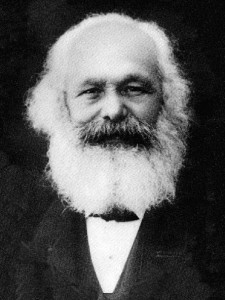
Well, as you can see from the photo above, and from innumerable other photos and videos I’ve obtained from the Hollywood BID Patrol, there is a real problem with BID Patrol officers looking like LAPD. Their uniforms are the same color, their badges are the same shape and color, and so on. Also, they’re famous for not having a complaint process, or at least not one that anyone can discover easily. The Andrews International BID Patrol isn’t the only one with this problem, either. The Media District‘s security vendor, Universal Protection Service, doesn’t seem to have one either. In fact, it was UPS Captain John Irigoyen‘s refusal to accept a complaint about two of his officers that inspired the establishment of this blog. The A/I BID Patrol is as guilty of this lapse as anyone.

A little bit of Google juice led me to LA City Council file 99-0355, in which the story begins to unfold. It seems that, in 1999:
…the Police Commission, which regulates private patrols, has put the Downtown Center BID and other BIDs on notice for failure to comply with its rules and regulations regarding private patrol services. Specifically, the Commission’s rules require that private patrol service uniforms be grey in color. The notification also indicated that the Downtown Center BID needs to pay the City’s permit fees.
But, in response:
The Downtown Center BID states that the City’s fees and requirements, in combination with those of the State’s, are prohibitive given the BID’s limited financial resources. They also indicate that the regulation of uniform color conflicts with their operational philosophies.
In other words, even though they would soon be able to afford to pay front woman Carol Schatz a zillion dollars per hour, they were too broke to pay a few hundred bucks registration fees and also they really wanted their security guards to be able to wear purple shirts.
Well, the original issue in this council file was to get the City Attorney and the Chief Administrative Officer to report back to the council about how to exempt the BIDs from all city regulation and, while waiting for the reports,
that the City Ccl request the Police Commission to cease their enforcement against the City’s Downtown Center BID and its private patrol service, and any other BIDs until this matter has been reviewed by the City Ccl.
This is prior to the date when one can reliably find all council file materials on line, and this file is no exception. The only document available there is the final ordinance, enacted on June 20, 2000. At first glance, this looks like a complete rewrite of LAMC 52.34, but without the history and the reports, it’s hard to be sure exactly what happened. The text on the file’s web page refers to a number of reports from the City Attorney, so I asked Mike Dundas to rustle up some copies. He told me that he was going to look but he doubted that they had much stuff around from 16 years ago, and recommended that I check at the City Archives.
For whatever reason, it hadn’t occurred to me that they’d store old council file material there, but they do, so I headed over to Ramirez Street last Tuesday and copied over a hundred pages of stuff. It’s stored locally and I also put a copy on Archive.org. There is a lot of interesting material here, and it’s pretty hard to piece together the story. My best guess right now, though, is that the only substantive change with respect to BID security was that they no longer had to wear gray uniforms. If this turns out to be correct, it means that at least the three major BID security contractors mentioned above are in violation of the LA Municipal Code. I’m working on that aspect of things and will let you know. Meanwhile, a brief guide to the documents follows. Note that I’m focusing only on the parts involving the BIDs, but most of the material is on the question of which aspects of the City’s regulatory apparatus are preempted by state law.4

- Council File 97-2341 (Alatorre Bernson) — This is an entire three page council file, and is a precursor to the file we’re discussing here. It has essentially no online presence. It’s a motion by Richard Alatorre and Hal Bernson to amend LAMC 52.36 to exempt BID security from all Police Commission regulation. It never went anywhere, at least in this form, as can be seen by the fact that there is no section 52.36 in the LAMC. Most interesting, perhaps, is a 2001 letter from Miranda Paster, who is now in charge of the BID section at the Clerk’s office,5 but was at that time apparently a legislative assistant with the Council’s Community and Economic Development Committee. In this note, she asks then-CAO William Fujioka6 to prepare a report for the CEDC, I suppose for the purpose of reviving the motion. It never went anywhere, and this letter isn’t even noted in the online history of the motion, such as it is.
- Original motion initiating CF 99-0355 — This stopped the Police Commission’s 1999 investigation of the DCBID and directed various agencies to report to the Council on how to exempt BIDs from city regulation.
- May 19, 1999 Police Commission recommendation to Council — This is the most interesting of a series of preliminary recommendations from the Police Commission to the Council. The others are here and here. It contains reports on what the BIDs wanted (no regulation by the City at all) vs. what the Commission recommends (allowing purple uniforms but retaining all other regulations). As far as I can tell all of these recommendations were followed in the final ordinance. This document also contains a recommendation that the ordinance be amended to include an actual definition of BID security officers, so that additions could be made throughout to exclude them from this and that requirement. The proposed section would have been 52.34(a)(3), which does not appear in the current version of the law, and neither do any of the other BID-specific changes recommended here.
-
Finally, there are a bunch of sets of speaker cards from various committee and full Council meetings:
What’s most interesting about these is to see the BIDs turning out in force to support them no longer being regulated, and a few people from the legitimate private security world, e.g. Pinkerton, turning out to oppose deregulation. I suppose the issue was that it would be anticompetitive to exempt some private security vendors from City regulation while continuing to subject others to it.

Anyway, I know this is a fragmentary telling of a complicated, immensely consequential, seemingly unknown, part of the history of BIDs in Los Angeles. I’m sorry if my interpretation is confusing, but I thought it was crucial to make these documents available with as much context as I’ve been able to put together. Also, keep in mind that interpretation is fine, but change is the goal. Expect more news as it comes in!
Image of BID Patrol officers is a public record, as is image of Richard Tefank. We got the latter item from the LAPD. Image of Bill Fujioka is a public record and we got it from Zev Yaroslavsky’s website. Image of Marx is PD, PD, PD, and get your copy here.
- This is a lot more interesting than it sounds. I highly recommend it.
- It turns out to be extremely difficult to interpret statutes if one’s not trained.
- Who we haven’t really discussed here ever, but they work at least for South Park BID in Los Angeles, and seem to specialize in BID security around the country.
- The two issues are not as separate as I’m making them out to be here. The state passes a minimum regulatory framework, but recognizes that local areas may have more specific needs based on highly local conditions. Clearly densely packed urban areas like Los Angeles are going to have issues and require unique regulations when it comes to private security guards patrolling public streets, and surely BID Patrols are an instance of these unique urban conditions. Thus the state allows localities to add regulations on top of the state framework under certain conditions.
- And who is a boot-licking lackey of the BIDs she’s supposed to oversee. No one here has had time to write on this yet, but we will some day. She and City Clerk Holly Wolcott are deep in the BIDs’ pockets. There’s no one over there in charge of things, which is why Kerry Morrison and Carol Schatz have essentially written all LA City BID laws and policies since the 1990s, and even now tightly control their implementation and execution. Shameful.
- Later CEO of LA County.
- Or trying to look, anyway; the BIDs are getting super-testy about letting me see their old minutes.
- All of which were represented on the speaker cards.
